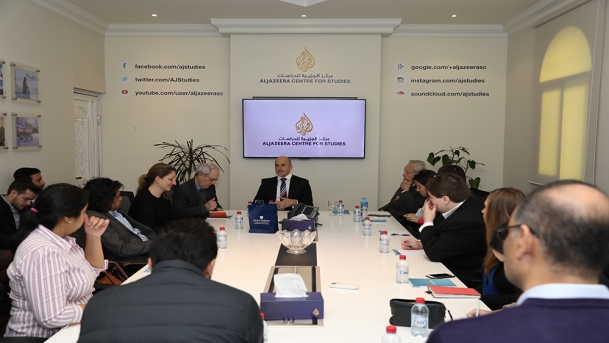
On Monday, 21 January 2019, a panel discussion was held at Al Jazeera Centre for Studies with researchers from the centre and a delegation from Johns Hopkins University. The delegation is on a study activity visiting several research centres, educational institutions and politicians around the Gulf region.
The panel was opened by Director of Research Ezzeddine Abdelmoula, who introduced the centre and the methodology it uses in the preparation of research, studies and policy briefs. The discussion then turned to several issues raised by the students. In this context, the panel analysed the Gulf crisis two years on, the political, economic and social fallout of the crisis, and prospects and opportunities to resolve it.
The Johns Hopkins University delegation had several questions about Iran, particularly regarding the possibility of war with the country and its regional relations, especially with countries of the Gulf Cooperation Council, Turkey, Yemen, Lebanon and Iraq.
The delegation also asked several questions about Saudi Arabia and the factors for instability and stability, both external and internal, given that power is concentrated in the hands of Crown Prince Mohammed bin Salman and in light of his policies in the region over the last two years.
The United Arab Emirates was also a focus of some students’ questions and inquiries, particularly its economic relations with Iran, the nature of its alliance with Saudi Arabia and its influence over Saudi decision making.
The panel concluded with a discussion of the Arab Spring eight years later, as students wondered if Arab countries were facing a new wave of popular protest and what the political and social consequences would be.